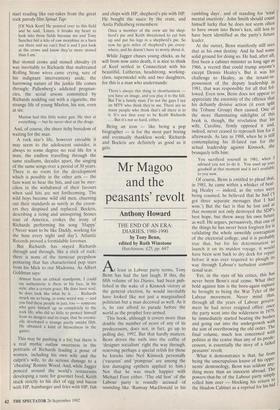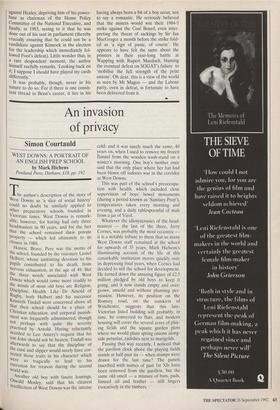Mr Magoo and the peasants' revolt
Anthony Howard
THE END OF AN ERA: DIARIES, 1980-1990 by Tony Benn, edited by Ruth Winstone
Hutchinson, #25, pp. 687
At least in Labour party terms, Tony Benn has had the last laugh. If this, the fifth volume of his Diaries, had been pub- lished in the wake of a Kinnock victory at the general election, he would inevitably have looked like not just a marginalised politician but a man deceived as well. As it is, he can afford to parade before the world as the prophet fore-armed.
This book, although it covers more than double the number of years of any of its predecessors, does not, in fact, go up to polling day, 1992. But that hardly matters. Benn drives the nails into the coffin of `designer socialism' right the way through, reserving perhaps a special relish for those he knocks into Neil Kinnock personally (`vacuous' and 'pompous' are among the less damaging epithets applied to him.) Not that he was much happier with Michael Foot either. 'The old lion' of the Labour party is roundly accused of sounding like 'Ramsay MacDonald in his rambling days', and of standing for 'total mental inactivity'. John Smith should count himself lucky that he does not seem often to have swum into Benn's ken, still less to have been identified as the party's future leader.
At the outset, Benn manifestly still sees that as his own destiny. And he had some solid ground for doing so. He had, after all, first been a cabinet minister as long ago as 1966, a record that could trump anyone's except Dennis Healey's. But it was his challenge to Healey, as the tenant-in- possession of the deputy leadership in 1981, that was responsible for all that fol- lowed. Even now, Benn does not appear to appreciate the enormity of the offence that his defiantly divisive action (it even split the Tribune Group) then caused. One of the more illuminating sidelights of this book is, though, the revelation that his wife, Caroline, firmly opposed it and, indeed, never ceased to reproach him for it afterwards. As late as 1988, when he is still contemplating his ill-fated run for the actual leadership against Kinnock, she brusquely tells him:
You sacrificed yourself in 1981, when I advised you not to do it. You used up your goodwill at that moment and it isn't available to you now.
Of course, Benn is entitled to plead that, in 1981, he came within a whisker of beat- ing Healey — indeed, as the votes were being counted, he believed that he had CI got three separate messages that I had won.') But the fact is that he lost and at that moment not only destroyed the SDP's best hope, but threw away his own future as well. He argues, persuasively, that one of the things he has never been forgiven for is validating the whole unweildy contraption of the electorial college, and it is probably true that, but for his determination to launch it on its maiden voyage, it would have been sent hack to dry dock for repair before it was ever required to plough its way through Labour's turbulent constitu- tional seas.
Yet, in the eyes of his critics, this has never been Benn's real crime. What they hold against him is the born-again rapture he brought to being the Wat Tyler of the Labour movement. Never mind that, through all the years of Labour govern- ment he had never resigned office: once the party went into the wilderness in 1979, he immediately started beating the bushes and going out into the undergrowth with the aim of overthrowing the old order. The final volume, much less concerned with politics at the centre than any of its prede- cessors, is essentially the story of a failed peasants' revolt. What it demonstrates is that, far from being the unscrupulous knave of his oppo- nents' demonology, Benn was seldom any- thing more than an innocent abroad: The powers-that-be of the Labour party simply rolled him over — blocking his return to the Shadow Cabinet as a reprisal for his bid
against Healey, depriving him of his power- base as chairman of the Home Policy Committee of the National Executive, and finally, in 1983, seeing to it that he was done out of his seat in parliament (thereby crucially ensuring that he could not be a candidiate against Kinnock in the election for the leadership which immediately fol- lowed Foot's defeat). Little wonder that, in a rare despondent moment, the author himself ruefully remarks, 'Looking back on it, I suppose I should have played my cards differently.'
It was probably, though, never in his nature to do so. For if there is one consis- tent thread in Benn's career, it lies in his having always been a bit of a boy scout, not to say a romantic. He seriously believed that the miners would win their 1984-5 strike against the Coal Board, even inter- preting the threat of sackings by Sir Ian MacGregor a month before the strike fold- ed as 'a sign of panic, of course'. He appears to have felt the same about the printers in their year-long battle at Wapping with Rupert Murdoch, blaming the eventual defeat on SOGAT's failure to `mobilise the full strength of the print unions'. Oh dear, this is a view of the world as seen by Mr Magoo — and the Labour party, even in defeat, is fortunate to have been delivered from it.



































































 Previous page
Previous page